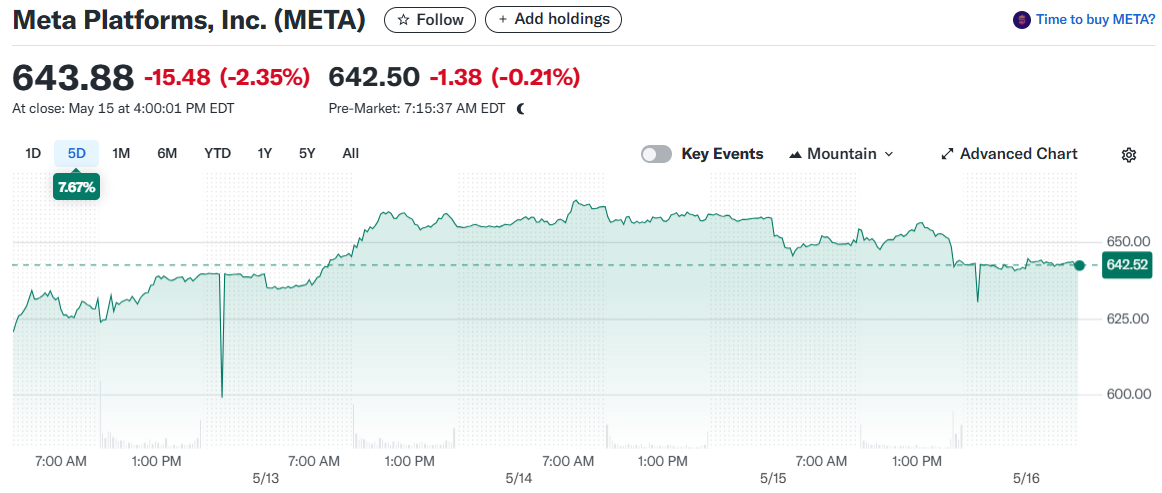TLDR
- Meta’s Behemoth AI model release delayed from June to fall 2025 or later due to capability issues
- META stock fell 2.4% Thursday but stabilized Friday, still up 10% for 2025 as top Magnificent Seven performer
- Meta increased 2025 capital expenditure forecast to $64-72 billion for AI development
- COO Javier Olivan sold 608 shares at $631.25, continuing a pattern of regular sales
- Meta beat Q1 earnings estimates with $6.43 EPS vs $5.33 expected and $42.31 billion revenue
Meta Platforms is facing challenges with its artificial intelligence ambitions. The Facebook parent company has pushed back the release of its Behemoth large-language model, initially planned for April, then June, and now delayed until fall 2025 or later.

Engineers are struggling to improve the model’s capabilities. Some staff have questioned whether Behemoth offers enough improvements over previous versions to justify a public release.
This delay comes as Meta pours billions into AI development. The company recently increased its 2025 capital expenditure forecast to between $64 billion and $72 billion, up from the previous range of $60-65 billion.
Despite the setback, Meta’s stock has shown resilience. After falling 2.4% on Thursday following The Wall Street Journal’s report on the delay, shares stabilized in Friday’s premarket trading.
META remains the top performer among the Magnificent Seven tech stocks in 2025, up 10% year-to-date through Thursday’s close.
Executive Movements and Insider Trading
Meanwhile, Meta’s Chief Operating Officer Javier Olivan continues a pattern of regular stock sales. He sold 608 shares at $631.25 per share on May 12, netting $383,800.
This transaction reduced Olivan’s position by 19.06%, leaving him with 2,582 shares valued at approximately $1.63 million.
The sale follows similar weekly transactions by Olivan. He has consistently sold 608 shares every Monday since early March, with selling prices ranging from $488.18 to $673.96 per share.
These routine sales appear to follow a predetermined trading plan rather than reflecting any immediate concerns about the company’s prospects.
Meta shares have traded between $442.65 and $740.91 over the past 52 weeks. The stock closed at $659.36 on Wednesday, with heavy trading volume of over 12.3 million shares.
Financial Performance Remains Strong
Despite the AI delays and insider selling, Meta’s financial performance continues to impress investors.
In its latest quarterly report released on April 30, Meta posted earnings per share of $6.43, surpassing analysts’ consensus estimates of $5.33 by a substantial margin.
Revenue reached $42.31 billion for the quarter, exceeding expectations of $41.45 billion and representing a 16.1% increase year-over-year.
The company maintains a healthy balance sheet with a debt-to-equity ratio of just 0.16. Meta’s current ratio stands at 2.98, indicating strong short-term liquidity.
Meta also rewards shareholders with a quarterly dividend of $0.525 per share, representing an annual yield of 0.32%. The company recently increased this dividend from its previous $0.50 quarterly payment.
Wall Street remains largely bullish on Meta’s prospects. Of the analysts covering the stock, 37 rate it a “buy,” 2 give it a “strong buy,” 4 maintain a “hold,” and only 1 recommends “sell.”
The average price target stands at $696.45, suggesting potential upside from current levels.
Meta’s market capitalization stands at approximately $1.67 trillion, with a price-to-earnings ratio of 27.57.
In other company news, Meta asked a federal judge on Thursday to dismiss the Federal Trade Commission’s antitrust case alleging it operates an illegal social media monopoly. The trial, which concerns Meta’s acquisitions of WhatsApp and Instagram, began last month.
As Meta navigates these challenges, investors appear to be taking a measured approach, focusing on the company’s strong financial fundamentals rather than the temporary AI development delays.






